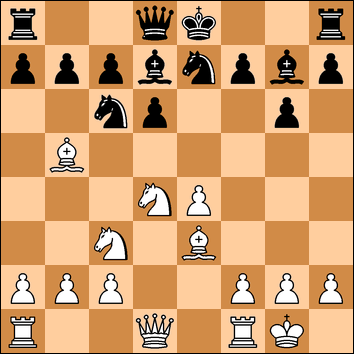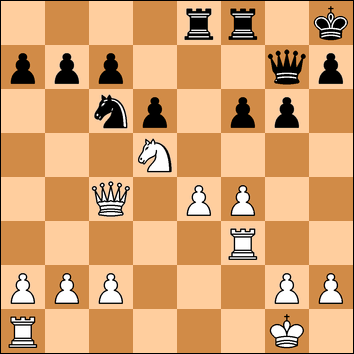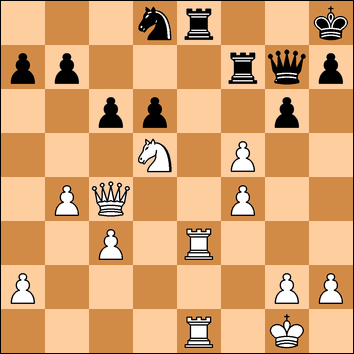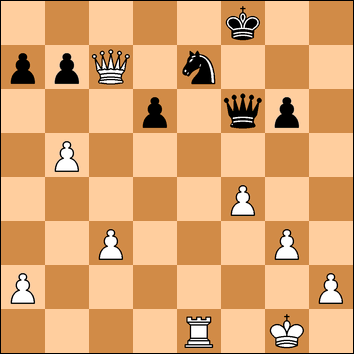Thursday 20 April 2017
White: K. Nevols (134) - Black: M. Maurant (129)
The semi-final, and we were at home. This is the first time I had played in a match with an arbiter present!
1. e4 e5
2. Nf3 Nc6
3. Bb5 d6
This is known as the Ruy Lopez Old Steinitz Defence - a solid defence - and the second consecutive time I had faced it. So this time I try a different line.
4. d4 exd4
5. Nxd4 Bd7
6. Nc3
Not knowing much about this opening I decide to develop calmly. It didn't look too threatening to me.
6. ... g6
I gave some thought an immediate 7. Be3 with the idea of Qd2 and castles queenside, but decided to just play naturally.
7. O-O Bg7
8. Be3 Nge7

Throughout Black had avoided the usual Ruy Lopez move ... a6. It was time to think of a plan. Aware of my seeming inability to win dull even positions, I decided to mix it up a bit by throwing the f-pawn forward - a move which is becoming very common in my games. The computer recommends 9. a3 to wait and see and also to protect against a future excursion with Nb4.
9. f4
Castling for Black now makes for an even game. Instead we go into some exchanges.
9. ...... Nxd4
10. Bxd7+ Qxd7
11. Bxd4 Bxd4
12. Qxd4 O-O
This reminded me of the story where the great Victor Korchnoi asked an arbiter in a match if he could castle when his rook is being attacked. He said it had never come up before. Well, the answer is yes and here is an example.
No bishops on the board and some spaces around the black king. I figured I had a small edge so it was time to try to unsettle my opponent.
13. Rf3!
I quite like this move showing aggressive intent. But time trouble strikes again - I am now down to 41 minutes for the next 22 moves. (The time control is 75 minutes for 35 moves and then 15 more minutes each for the rest of the game). I think the problem could be that I am so concerned about being blasted away in 20 moves that I spend too much time examining the early positions.
13. .... Nc6
Now where shall I put Her Majesty? The c4 seemed best but a little exposed. I decided to retreat while I thought about what to do next.
14. Qd2 Rae8
I considered 15. f5 with the idea of a later Qg5 or Qh6 but did not want to give up the e5 square for a black knight. Instead I went for the best looking move, a good square for the knight and to threaten a fork. But now only 31 minutes left to reach move 35.
15. Nd5 f6?!
Better is 15. .. Qd8. This allows a slight weakness.
16. Qc3 Qg7
17. Qc4
17. Qb3 winning the pawn on b7 is an option but it also gives up the pawn on e4.
17. .... Kh8

The computer recommends 18. Re1 and regards the position as being completely equal. I agreed and decided to try for an advantage by unsettling that knight on c6.
18. b4??
After I played this, I saw with horror that the rook on a1 was undefended and Black could now take over the initiative with 18. .. f5. Grumbling internally I set to work to find a rescue mission.
18. ... f5
I thought there was only one move but another idea is 19. e5?! dxe5 20. Rd1 although Black has the pleasant choice of 20 ... e4 or 20. .. exf4 - remaining a pawn up either way.
19. Re1
I examined 19. .. Qd4+ 20. Qxd4 Nxd4 21. Rf2. Black has 21. .. Rxe4 and I cannot bag a pawn with 22. Rxe4 fxe4 23. Nxc7 - not because of 23. .. Rc8 (when White could play 24. Rd2! evening up the game) - but because of 23. .. e3! and White is close to resignation.
Much to my relief, Black did not play the winning move and, by then defending the d4 square, we were back to equality.
19. ... Rf7?
20. c3 Nd8
21. Rfe3
With 13 minutes left for 12 moves (my opponent had 23 minutes left) I was feeling a bit happier and could see this petering out to a draw - probably a fair result considering my earlier blunder.
21. ... c6
22. exf5
Black must now play 22. .. Rxe3 23. Nxe3 gxf5. Then 24. Qd3 and White can win a pawn either with 24. .. Qf8 25. Qd4+ and Qxa7 or 24. ... Qf6 25. Nxf5! Qxf5 26. Qxf5 Rxf5 27. Re8+ Kg7 28. Rxe8.
Somewhere along the line, Black miscalculates and blunders.

22. .... cxd5??
23. Rxe8+ Rf8
24. Qc8 wins the game. Instead, stunned by the sudden turnaround of events, I decide to consolidate to a smaller but durable lead.
24. Rxf8+ Qxf8
25. Qd4+ Kg8
26. Qxd5+ Kg7
27. fxg6 hxg6
28. g3
Insurance against any perpetual check accidents.
28. .... Qf6
29. Qc4 Nc6
30. b5 Ne7
31. Qc7 Kf8
Simple from here. Remove the black queenside pawns and then sacrifice the exchange to get down to a winning king and pawn ending.

32. Qb8+ Kf7
33. Qxb7 d5
34. Qxa7 Qd6
35. Qxe7+ Qxe7
36. Rxe7+ Kxe7
37. a4
Black now resigned.
We lost the match by 2-4 and our good tournament run was complete.
Swale v Beckenham
Keith Hyde (167) 1/2-1/2 Alan Sands (173)
Trefor Owens (167) 1/2-1/2 Jon Griffiths (147)
David Page (135) 0-1 Adrian Davey (138)
Keith Nevols (134) 1-0 Malcolm Mourant (129)
Ian Lappin (125) 0-1 Tony Foreman (128)
Dennis Simpson (105) 0-1 AJW Davey (125)
Swale 2-4 Beckenham
No comments:
Post a Comment